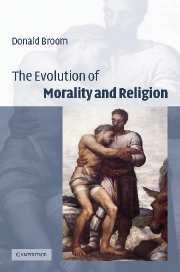Book contents
- Frontmatter
- Contents
- Preface
- Acknowledgements
- 1 Concepts and codes of living
- 2 Cooperation, altruism, reciprocal altruism
- 3 Biological capabilities needed for altruism and morality
- 4 Ideas about morality
- 5 The origins and value of religion
- 6 Other views about the origins of morality and religion
- 7 Social and political consequences of this biological view of morality and religion
- 8 Conclusions
- References
- Species list
- Author index
- Subject index
6 - Other views about the origins of morality and religion
Published online by Cambridge University Press: 18 December 2009
- Frontmatter
- Contents
- Preface
- Acknowledgements
- 1 Concepts and codes of living
- 2 Cooperation, altruism, reciprocal altruism
- 3 Biological capabilities needed for altruism and morality
- 4 Ideas about morality
- 5 The origins and value of religion
- 6 Other views about the origins of morality and religion
- 7 Social and political consequences of this biological view of morality and religion
- 8 Conclusions
- References
- Species list
- Author index
- Subject index
Summary
MORALITY, RELIGION AND BIOLOGY AS MUTUALLY OPPOSED
The diatribes of nineteenth century theologians against evolutionary theory are well documented. The concern that the theory of evolution by natural selection would in some way invalidate or damage the Christian and other religions is frequently stated even now. Even in the last years of the twentieth century it was possible for the educational legislators of a State in the United States of America to propose the prohibition of the teaching of evolution in schools. However, although the view of man as having evolved from non-human ancestors is contrary to the concept of man held by many in the past, it does not contradict the important tenets of the Christian or other faiths, merely the stories which were contrived to explain the origin of humans. Even in 1870, many people did not take some parts of the Bible literally so the addition of another part which would not be viewed as correct was not as great a revolution as some people made out.
A much more long-lived and influential view which arose from the writings of Darwin and his followers about evolution was that processes in nature are just to do with competition. ‘Nature red in tooth and claw’ has been difficult to reconcile with codes of moral behaviour whether or not they were taught within a religious framework.
- Type
- Chapter
- Information
- The Evolution of Morality and Religion , pp. 194 - 203Publisher: Cambridge University PressPrint publication year: 2003



